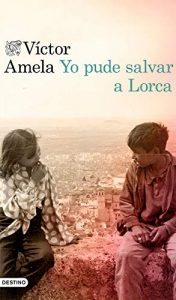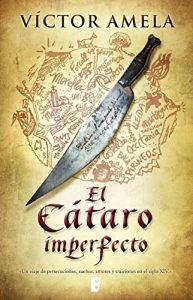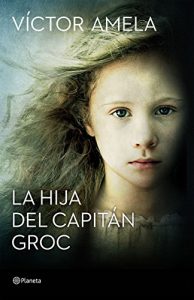History and its possibilities to present the chronicle by diving into the facts, or to fictionalize intrahistories. Victor Amela composes one of those bibliographies that reconcile fiction and non-fiction around an essential argument of the human as is the historical.
In the same way as other authors such as Jose Luis Corral o Juan Slav GalánSometimes it can be informative and on other occasions they indulge in that fascinating resuscitation of the past that only their capacity allows for novelization.
Víctor Amela often builds his stories from the anecdotal to end up assaulting the moments of history in the most surprising way, a whole literary goldsmith task that offers us a captivating glimpse of each stage staged.
Top 3 recommended books by Victor Amela
I was able to save Lorca
With a title that evokes a desirable uchrony that could have changed everything regarding the ominous end of the great poet, Víctor Amela leads us between the testimony and the romantic for an emotional and surprising final composition.
When we dive into each other's family environment, before, during and after the civil war, fascinating stories of survival end up being composed. Every day there are fewer testimonies of those dark times and yet full of bright, disconcerting, even disturbing intrahistories ... Víctor Amela has managed to capture in a book, halfway between reality and fiction, one of those great compositions of destiny between lives on the rope lax from the most adverse circumstances.
«I was able to save Lorca rebuilds the life of Manuel Bonilla, my grandfather, peasant and shepherd of the Alpujarra who became a clandestine passer-by of people from one side of the Granada war front to the other. The military uprising dragged him into the well of one of the most tragic and universal events of the war in Spain: the murder of the poet Federico García Lorca. A horror that will weigh on him forever in a life that intertwines with that of other characters, famous some such as Luis Rosales, Ramón Ruiz Alonso, Gerald Brenan, Agustín Penón, Emilia Llanos, and anonymous others, such as Josep Amela, a republican soldier who will be their prisoner: time and chance will make them members of the same family. "
The novel rescues the anonymous life of a victor in war and defeated in history. Boarded the train of an ideal (like all the others), the life of Manuel Bonilla crosses the miserable Alpujarra, Granada de Lorca and post-war Spain until depositing the reader, through the search for his grandson, in today's Barcelona. A journey whose twists and turns will resonate in the sensibility and in the heart, family and collective, of any reader of today's Spain.
The Imperfect Cathar
The mythical of the Cathars, the fascinating nickname for the faithful of a thriving religious movement between southern France and the Crown of Aragon, until Catholicism ended up taking them away under the easy sentence of heresy.
Year 1306: with his dagger with a curved blade, Belibasta kills. Flee to the south of the Pyrenees. From Occitania to Morella. From murderer to saint! A Jesus Christ with his Magdalena. Some believers, the last Cathars hidden in Catalan, Aragonese and Valencian towns. A faithful and transhumant shepherd of sheep. An inquisitor who aspires to be Pope. A greedy and cunning spy. An emancipated and poisonous widow. From friendship to betrayal! From a concubine to a forced marriage. Year 1321: from a sacrificial journey to childbirth. And from a dagger to a carved stone ...
Based on rigorously historical facts and characters, this absorbing novel reconstructs the daily lives, dreams and beliefs of a handful of heretics at the dawn of the XNUMXth century. Treasures and flocks, Moors and fortune-tellers, rituals and inquisitors, Jews and Templars, stonemasons and brothels intersect in the landscapes of a true story. The spiritual and the carnal come together in a plot of seven hundred years ago in which love will have the last word… From Occitania to Morella: the real story of the last heretics of Catharism. An impressive tribute to those men and women whose dogma clashed with the Catholic Church until its extinction in the XNUMXth century.
Captain Groc's daughter
The nineteenth century in Spain was reproduced, seen under a free interpretation, as a succession of Carlist wars that, over the years, and because of the fascination of the loser who does not write history, there are those who have taken care of transfiguring it everything.
Because the losing Carlists defended the traditional, the monarchical, the continuity. And yet, as they lost, they are taken as representatives of the fight against the established, fascinating the capacity for human selection ... But focusing on the plot of this novel, we are getting to know a special Catalan lineage of those years, the Groc, known thus for the hair, particularly between blond and red, of the emblematic Tomàs Penarrocha ...
Manuela Penarrocha is thirteen years old. Sitting in a low enea chair in the doorway of her house, she sews espadrilles like no one else. The girl with gray eyes and golden hair remembers her father. He, like the rest of the Carlists, a man with an espadrille, a club, a blunderbuss and a knife in the folds of his girdle, has worn one like these to make war. He wants to hug him, feel the warmth of his kiss on his forehead. He longs for his hard look and at the same time full of tenderness, his deep laugh. He only hopes that he returns to see him fight again for his ideals, to give back to his family and the people the lost dignity, life or death. Because of the color of his hair, his father, Tomàs Penarrocha Penarrocha, is known to everyone in Forcall as el Groc.



